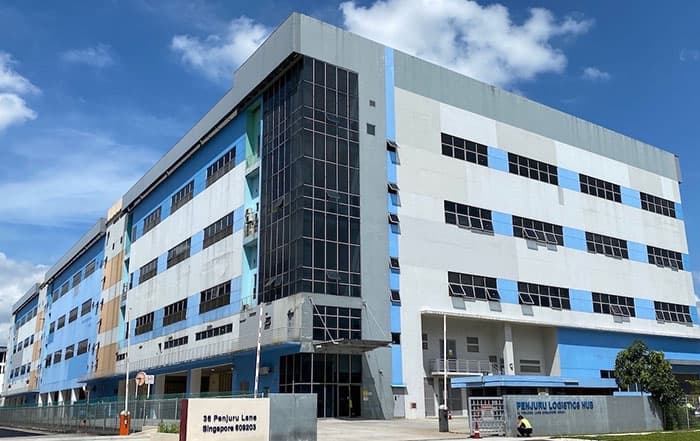
The Penjuru Logistics Hub in western Singapore will soon join ESR REIT’s portfolio
Hong Kong-based logistics developer and fund manager ESR, which has $22.1 billion in assets under management, is consolidating its presence in Southeast Asia’s highest value market by merging a pair of Singapore industrial real estate investment trusts it manages in a deal valued at S$397 million ($285 million).
Through the proposed transaction, ESR-REIT would acquire Sabana Shari’ah Compliant Industrial REIT in an all share deal that will see Sabana shareholders receiving 94 new ESR-REIT shares for every 100 shares held, the two companies backed by Hong Kong-listed warehouse developer ESR said in a joint statement on Thursday.
The merger would follow ESR-REIT’s 2018 acquisition of Viva Industrial Trust as the Warburg Pincus-backed Singapore trust continues to gobble up smaller competitors in Singapore’s fragmented industrial market.
The deal comes as the trust manager’s parent firm, Warburg Pincus-backed ESR, raised around $2 billion in fresh capital during the first four months of this year to expand its regional logistics footprint.
Boosting Scale to Reduce Risk
“The greater scale of the enlarged REIT diversifies our portfolio, reduces risks and enhances our resilience, especially in view of the COVID-19 pandemic,” said Adrian Chui, CEO and executive director of ESR-REIT’s manager. “It also provides us with the potential to reap significant operational synergies and realise upside through portfolio lease-up, asset enhancement initiatives, and redevelopment opportunities.”

ESR REIT boss Adrian Chui is expanding his Singapore holdings
The deal translates into Sabana shareholders receiving an implied consideration of S$0.377 per share, a 4.7 percent premium from the REIT’s last traded price of S$0.36 before the merger was announced.
The merged entity will own and operate 75 industrial properties across Singapore with a combined value of S$4.1 billion, which would make ESR-REIT the fourth largest industrial REIT in the country by market share.
The enlarged entity would derive “better operational synergies post-merger and greater scale, which would make it easier to implement asset enhancements,” David Lum, an analyst at Daiwa in Singapore, wrote in a research note.
Some of ESR-REIT’s properties, particularly in the western Singapore town of Tuas and the northern suburb of Ang Mo Kio have yet to utilise the full potential of their sites, giving the trust the potential to develop more than 2.2 million square feet (204,386 square metres) of fresh gross floor area, Chui said.
MNCs Reconfiguring Global Supply Chains
While average occupancy of Sabana’s industrial properties is at 80 percent, compared to 91 percent within ESR-REIT’s portfolio, Chui said he is confident of the leasing prospects of the company’s industrial assets, given emerging demand from multinational corporations looking to reconfigure their global supply chain facilities.
“There are pockets of demand coming through from MNCs,” said Chui. “They are rethinking their global supply chain requirements that’s been disrupted during the COVID-19 pandemic.”
The merged entity will have a market capitalisation of S$1.8 billion and a free float of S$1.3 billion, with the combined portfolio ranking ESR REIT as the fifth largest industrial trust in Singapore by the scale of its assets. While Sabana will no longer be shariah compliant post merger, Chui said that, with its greater scale, the combined trust will appeal to a wider pool of investors.
Hong Kong-listed ESR has been building its stake Sabana REIT as part of its campaign to build a heavyweight player in Singapore’s fragmented industrial REIT sector. Through a series of transactions last year, the Warburg Pincus-backed logistics fund manager and warehouse developer invested S$62.2 million to bring its stake in Sabana REIT’s manager to more than 90 percent, while the company holds 21.4 percent of the units in the listed trust, ranking it as the top investor in the vehicle
E-Commerce Boom Bolsters Logistics Demand
While the COVID-19 pandemic has upended most industries and dragged the global economy into recession, it has been a boon for logistics assets as spiking use of e-commerce has bolstered demand for warehouse space across the region, industry experts said Tuesday in the second installment of Mingtiandi’s MTD TV online video series on Asia Pacific logistics opportunities.
With e-commerce and other online services such as video conferencing becoming ubiquitous for consumers forced to work and shop from home due to the implementation of social distancing measures to curb the further spread of coronavirus, demand for data centre space has also been rising.
ESR-REIT is in talks with a data centre operator keen on taking space in one of its industrial properties, Chui said. The project, however, is on hold pending a government review of policies concerning data centre operations, he pointed out.
Upon completion of the deal, which is expected in the fourth quarter of this year, subject to shareholder and regulatory approvals, ESR through ESR Cayman will own 12.2 percent of ESR-REIT and 67.3 percent of the REIT’s manager. Mainland China businessman Tong Jinquan, who controls Shanghai-based Summit Property Development, will be the largest shareholder of the merged entity with an 18.5 percent stake.
Transformational Merger for Sabana
“The merger will be transformational for Sabana REIT, accelerating our growth and propelling us immediately to be amongst the largest industrial REITs in Singapore,” said Donald Han, CEO of Sabana REIT’s manager. “The enhanced scale will raise our visibility and enable us to be more competitive within the industrial S-REIT space, while the larger asset and tenant base will put us in a stronger position to undertake initiatives to improve and rejuvenate the portfolio at lower costs with minimised execution risks.”
ESR-REIT said it will take on about S$372.2 million in new debt, comprising S$295 million of Sabana’s existing debts and another S$58.6 million needed to fund land premium payments to the government. The new borrowing will bring the merged entity’s gearing to 41 percent, still within Singapore’s regulatory limit of 45 percent.
Leave a Reply